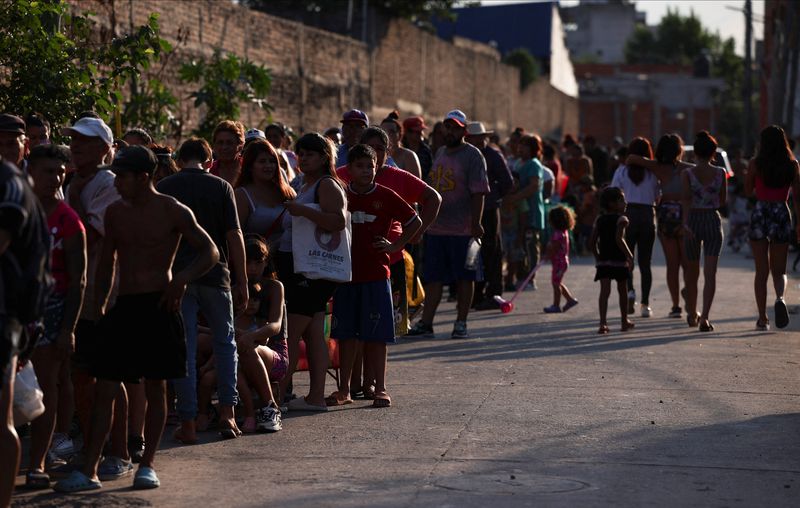Please try another search
Published Mar 05, 2024 05:02AM ET
Updated Mar 05, 2024 04:56PM ET
5/5
© Reuters. People wait in line to receive a charity food bag, outside the NGO Sal de la tierra, in Villa Fiorito, a working-class neighborhood on the outskirts of Buenos Aires, Argentina February 27, 2024. REUTERS/Agustin Marcarian
2/5
By Nicolás Misculin and Miguel Lo Bianco
VILLA FIORITO, Argentina (Reuters) – Debora Blanco has lived for years with her eight children in a house on the outskirts of Buenos Aires with no proper door or windows, nor electricity, mains gas, running water or sewers. Now she doesn’t have enough food to eat, either.
Argentina’s poverty rate topped 57% at the start of the year, one recent study showed, with millions like Blanco battling triple-digit inflation and smarting from a sharp devaluation of the peso in December that sapped the real value of people’s money.
That pain in the South American country’s poor barrios looms large over new libertarian President Javier Milei’s aggressive austerity drive as he seeks to overturn a deep deficit and tame inflation over 250% – before losing popular support.
His plans include slashing the size of government, trimming back subsidies for fuel and transport, shutting state institutions, and auditing welfare schemes.
Milei, an economist, is calling for patience and says his tough medicine reforms are necessary. That argument propelled him to office, winning over many voters in last November’s election who were tired of the economy sliding from one crisis to another.
But Argentines like Blanco won’t wait forever. Already protests against Milei’s spending cuts are starting to build and strikes have become a regular occurrence.
“We’re in need, sometimes I don’t have food or milk for the kids. Food prices are through the roof,” said Blanco, 43, who works collecting waste to recycle and receives a state subsidy.
“We will not be able to survive five or six months, as the government says. I don’t believe people will be able to survive that long.”
Outside Congress on Friday, as the president spoke inside, a few thousand people protested, waving banners against rising transport costs, privatizations, and Milei’s reform plans.
“They have devalued our wages, they are meddling with our pensions, and there are brutal increases in prices,” said leftist protest leader Guillermo Pacagnini. “Now is the time to fight.”
Milei has pledged a fiscal balance this year from a deficit of around 3% last year, a move that has been welcomed by markets and won backing from the International Monetary Fund (IMF). But he admits the road will be tough for regular Argentines.
“It will be some time before we can see the fruits of the economic recovery and the reforms we are implementing,” he said in his Friday speech to Congress. “I ask you for patience and trust because no matter how dark the night the sun always rises in the morning.”
‘PEOPLE ARE REALLY HUNGRY’
Argentina, governed by the left-leaning Peronists for most of the last few decades, has robust welfare systems, though Milei’s government has criticized them for cost and corruption, pledging an overhaul while protecting the most vulnerable.
“We are working to improve transparency,” presidential spokesman Manuel Adorni said at a press conference in February. “But aid to soup kitchens will never be cut.”
Keeping poverty – and social unrest – in check is key for Milei, posing perhaps the biggest threat to governability and the market rally his fiscal tightening has sparked.
The IMF, which has a $44 billion program with Argentina – the biggest by far with any country globally – has applauded Milei, though emphasized the importance of ensuring protections for the poorest.
On the ground, however, NGOs who distribute food to the poor said their supply of food aid had been curtailed in recent months, even as more people were coming to soup kitchens as grocery costs soared.
“The current situation is dramatic. People are really hungry,” said Leonardo Alvarez, a street sweeper and pastor who coordinates food delivery with the Salt of the Earth NGO in the Villa Fiorito neighborhood, south of Buenos Aires.
The government did not respond to Reuters requests for further comment for this story, but has said it is evaluating various aid programs to improve them.
Agustin Salvia, a researcher on poverty at the Universidad Catolica Argentina, said most Argentines were clinging to the hope of economic recovery on rising grains output – but in the meantime, hardship was spreading.
“The social safety net is weakening,” Salvia said, adding that only the fact Argentines were hardened after years of economic crisis was staving off more serious unrest.
“We’re in a difficult moment in terms of food security and the process of chronic impoverishment in Argentina.”
>>> Read full article>>>
Copyright for syndicated content belongs to the linked Source : Investing.com – https://www.investing.com/news/economy/in-argentinas-barrios-rising-poverty-stalks-mileis-austerity-drive-3324194
